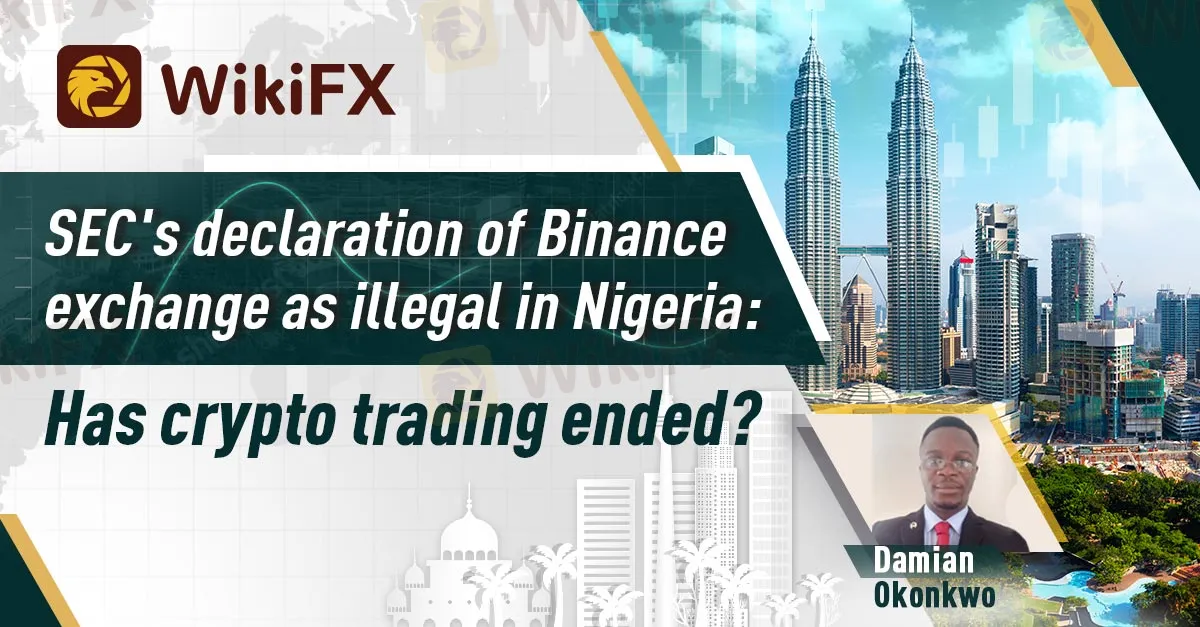简体中文
繁體中文
English
Pусский
日本語
ภาษาไทย
Tiếng Việt
Bahasa Indonesia
Español
हिन्दी
Filippiiniläinen
Français
Deutsch
Português
Türkçe
한국어
العربية
SEC's declaration of Binance exchange as illegal in Nigeria: Has crypto trading ended?
Abstract:The SEC's declaration of Binance exchange as an illegal dealer within the country has raised serious concerns among investors if this amounted to placing a ban on Cryptocurrency trading within the country. However, the body has not said so but only warned investors about the risks associated with dealing with these exchanges tagged as illegal dealers within the region.

By: Damian Okonkwo

The Nigerian Securities and Exchange Commission (SEC) had last week declared the activities of Binance Nigeria Limited, a subsidiary branch of the world's largest cryptocurrency exchange - Binance, as illegal in the country.
This therefore means that anyone who trades on Binance Nigeria Limited is doing so at their own risk and the SEC will not offer any protection in the event of losses.
The SEC's decision comes as a surprise to many, as Binance is one of the most popular and trusted cryptocurrency exchanges in the world. However, the SEC had classified the operations of this renowned Crypto exchange as illegal for not being registered or regulated by the Commission while rendering services to Nigerians.
The SEC's decision has sent shockwaves through the Nigerian cryptocurrency community, such that many investors are now wondering if this means the end of crypto trading in Nigeria.
The answer to this question is not very easy to arrive at. The SEC has not banned cryptocurrency trading outrightly within the country, but it has made it much more difficult for Nigerians to trade on regulated exchanges.
Nigerians may now turn to unregulated exchanges to trade cryptocurrency. However, this is a risky proposition. Unregulated exchanges are not subject to the same level of scrutiny as regulated exchanges and there is a greater risk of fraud and scams.
The SEC's decision is a major setback for the Nigerian cryptocurrency community. However, it is important to remember that cryptocurrency is still a new and emerging asset class. Regulators around the world will likely continue to grapple with how to best regulate cryptocurrency. In the meantime, Nigerians who are interested in trading cryptocurrency should do their research and choose a regulated exchange that they trust.
Here are some of the things to consider when choosing a cryptocurrency exchange today
Reputation: Make sure the exchange has a good reputation and has been in business for a while.
Security: Investors need to ensure that their chosen exchange has strong security measures in place to protect funds.
Regulation: The exchange should be regulated by a reputable financial authority.
Trading Fees: The exchange should have low fees so you can keep more of your profits.
Overall, it is important to remember that cryptocurrency is a volatile asset class and there is always the risk of losing money. Therefore, investors should be cautious to only invest money that they can afford to lose in cases of extreme market volatility or other failures.

Disclaimer:
The views in this article only represent the author's personal views, and do not constitute investment advice on this platform. This platform does not guarantee the accuracy, completeness and timeliness of the information in the article, and will not be liable for any loss caused by the use of or reliance on the information in the article.
Read more

Gigamax Scam: Tracking Key Suspects in RM7 Million Crypto Fraud
Malaysian authorities are actively pursuing seven individuals linked to the Gigamax investment scam, which has defrauded investors of over RM7 million. The suspects include an Indonesian national, identified as Awaludin, who is believed to be the mastermind behind the scheme, and six Malaysians who served as promoters and speakers for the fraudulent operation.

Singaporean Arrested in Thailand for 22.4 Million Baht Crypto Scam
Thai authorities have apprehended a 32-year-old Singaporean man suspected of being part of a transnational syndicate involved in cryptocurrency scams. The group is accused of defrauding victims of more than 22.4 million baht (S$886,000) through a fraudulent trading platform.

Kraken and BitGo to Handle FTX Payouts Starting January 2025
Kraken and BitGo will oversee the first FTX payouts starting January 3, 2025. 98% of creditors receive at least 118% of their claims in cash.

FCA Seeks Input to Shape UK Crypto Market Regulations
UK FCA seeks public feedback on crypto rules to improve market transparency, protect consumers, and support growth. Comments are open until March 2025.
WikiFX Broker
Latest News
Geopolitical Events: What They Are & Their Impact?
Volkswagen agrees deal to avoid Germany plant closures
Top 10 Trading Indicators Every Forex Trader Should Know
WikiEXPO Global Expert Interview: Simone Martin—— Exploring Financial Regulation Change
TradingView Launches Liquidity Analysis Tool DEX Screener
MultiBank Group Wins Big at Traders Fair Hong Kong 2024
'Young investors make investment decisions impulsively to keep up with current trends' FCA Reveals
Why Do You Feel Scared During Trade Execution?
CySEC Settles Compliance Case with Fxview Operator Charlgate Ltd
Malaysian Influencer Detained in Taiwan Over Alleged Role in Fraud Scheme
Currency Calculator


